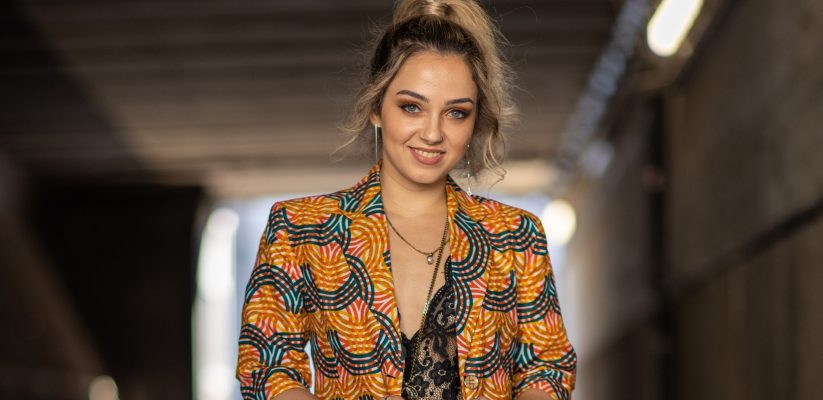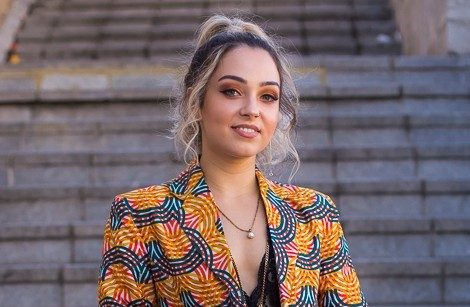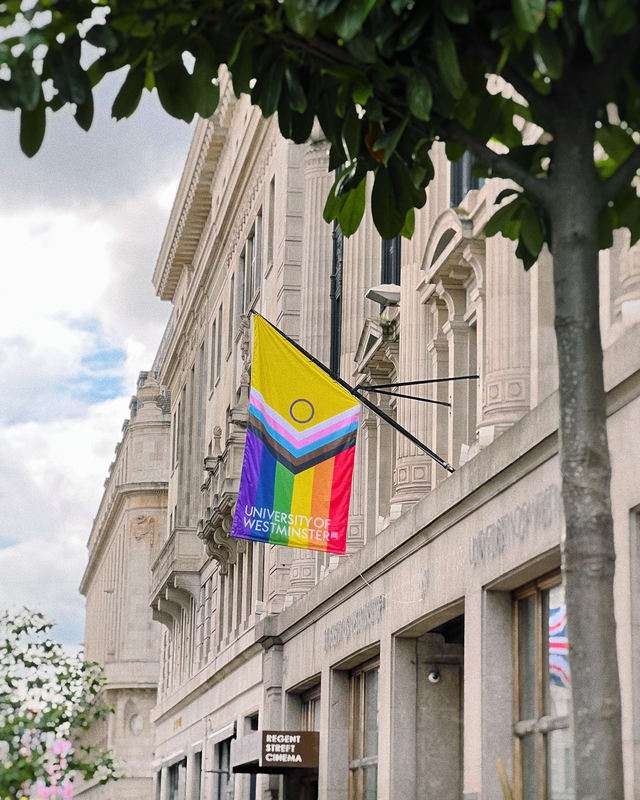This Pride month, we’re sharing the stories and celebrating achievements of our queer alumni. Here, we speak to Commercial Music Performance alumna, Maria Jula (She/Her), about pink washing, coming out at Westminster and her role as co-chair of the Q+ network.
“I realised I was gay pretty much 10 days after coming to the University.”
Maria is from Romania, a place where ‘traditional’ ideas of love are still very much the norm.
“Back home, even though I had those ideas and tendencies from when I was young, I had to suppress them and do what everybody else was doing.
“I never would have thought I could come out to my family.”
These days, things are very different. As well as working in the Mentoring Team at the University of Westminster, Maria is a qualified Personal Trainer and soon-to-be professional Nutritionist. But on the day we’re speaking, she is attending the University of Westminster’s fourth annual Equality, Diversity and Inclusion (EDI) conference in her other capacity: as a co-chair of Westminster’s Q+ Network.
The Q+ Network is a group which advocates for equity, and promotes diversity and inclusivity for colleagues at Westminster.
“It really has two sides,” explains Maria. “One is about having a community and a place for LGBTQ+ staff members to connect. Especially, recognising that for some colleagues, this might be their only safe space.
“The other is about advocating for change. So from things like gender neutral toilets on every campus to making sure pronouns are spelled correctly, and that gendered language is appropriate on our forms.”
Being able to have a safe and supportive environment to be your authentic self is an important issue for Maria. It was a difficulty she faced herself before coming to university.
“I come from Romania, a country where LGBTQ+ rights are not recognised in any kind of way.
“There was even a referendum to change the constitution to reflect the fact that a marriage is between a man and woman, even though that is already in the law. But laws are easier to change than the constitution.”
Fortunately the proposed change to prohibit same-sex marriage didn’t happen, but these prevailing attitudes meant Maria felt she: “couldn’t be myself at home”.
Coming (out) to Westminster
Studying at Westminster gave Maria the freedom to explore who she was and fully embrace it for the first time – it’s really where her LGBTQ+ story begins.
The support from her personal tutor, the University’s counselling services, the LGBTQ+ society and wider community helped Maria as she stepped out of her comfort zone and explored who she was.
“It was just so nice having the support to feel like it’s normal and it’s ok.
“I didn’t even feel the need to necessarily say anything to my family because I was living my authentic life 100% and being a lesbian in the UK, a lesbian at work, when I was studying and to my friends. That was enough for me at the time.
“The University really helped me step into myself and remove a lot of the shame that was associated with just being different.”
Now through the Q+ network, Maria is channelling her experiences into supporting the queer community – at the University and beyond. She has represented the University at events as co-chair, including the London Mayor’s LGBTQ+ reception evening.
“Being part of the Q+ network means I get to sit at tables with big decision makers, to get up and speak with people about what we’re doing.”
Problematic pink washing
But while LGBTQ+ campaigning is “going in the right direction by pushing for change”, these discussions alone are not enough.
“Government needs to be offering more than conversations. Every conversation needs have an action behind it. It’s finding the balance where representation is followed by action.
“Initially we were just happy to see the rainbow flag on everything and happy to be seen. But lately, people are questioning: where is that coming from? Is there actual work behind that? Or is it just: ‘I’m going to use this rainbow flag so I can sell my product’? So there’s a big debate which makes things even harder sometimes, even within the community, to come an agreement.”
With these complexities, especially around sensitive and intricate issues, Maria recognises the importance of representation. This year, the Q+ network has grown to include four committee members.
“We’re hoping to get more of a community too, allowing the space to have talks about rights but still keep a space for celebration.
“You need to listen to other people and that’s why having a community is really important. Because everybody’s got their own strengths and we want to listen to as many people as possible.
“I am humbled sometimes by members, but I’m open to listening and learning. It’s impossible to know everything that’s going on in the world, so you need to rely on other people too.”
Being proud
Taking a moment to reflect on her journey, what does Maria feel about all she has achieved?
“It’s almost ten years of change for me. I never thought I’d actually be able to have Q+ attached to my job role or be something I could do for work, or campaigning for change or being part of these big EDI conversations.
“I’m very proud that I was able to find myself and accept who I am. It took a lot of work to get rid of the shame that was attached to it, coming from an orthodox family, and it’s still an ongoing battle in the family setting. But I’m proud that I was able to do so much and I’m still striving to work towards the Q+ initiative.”
We’re incredibly proud of the impact our alumni are making around the world, campaigning for inclusivity and celebrating queerness. This Pride Month, we’ve been asking alumni in the Q+ community how Westminster supported them in becoming who they are today. Keep a look out for more stories this week.
- Peter’s Blog to Alumni - 27 January2026
- Could you mentor a Computer Science student this February and March? - 7 January2026
- India Alumni Survey Results - 27 October2025


